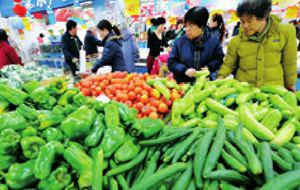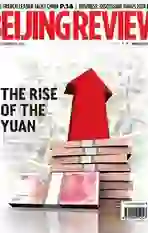Moto Acquisition
2014-02-25
A Flextronics plant that will be building the new Motorola smartphone Moto X in Fort Worth, Texas.
Lenovo will buy Motorola Mobility from Google for $2.9 billion, in a bid to boost its smartphone business in the Americas and Western Europe, as well as access thousands of patents, the Chinese company announced on January 30.
Under the deal, Lenovo will pay $1.41 billion in cash and its ordinary shares. The remaining$1.5 billion will be paid over three years.
“With the deal, we expect to become the No.3 smartphone manufacturer in the fast-growing global market,” said Yang Yuanqing, Lenovos Chairman and CEO, adding that the company has set the goal of selling 100 million smartphones in 2015.
The acquisition will enable Lenovo to enter key markets and receive over 2,000 patent assets and the iconic Motorola Mobility brand, Yang said.
Political Meetings
Journalists from China and abroad have been invited to cover two major political events in Beijing in March.
The Second Session of the 12th National Peoples Congress (NPC), the national legislature, will open on March 5.
The Second Session of the 12th National Committee of the Chinese Peoples Political Consultative Conference (CPPCC), the national advisory body, will open on March 3.
The general offices of the NPC Standing Committee and the CPPCC National Committee announced on February 1 that a media center for the two meetings will open from February 26 at the Media Center Hotel. Journalists are required to submit applications for reporting passes to the media center before February 28.
Two websites have also been launched to help domestic and overseas journalists cover the sessions.
The websites—www.npc.gov.cn/ pc/12_2 for the NPC session and www. cppcc.people.com.cn for the CPPCC session—will post information related to the events, the offices said.
New Banks
China will allow private investors to establish rural commercial banks to inject more funds into the countryside and boost rural development, according to the China Banking Regulatory Commission.
Private investors have long been shareholders in rural commercial banks, but they have not been allowed to start them.
The commission said that China is committed to financial innovation in rural areas to better serve agricultural development.
China had set up a variety of small and medium-sized financial institutions in rural areas by the end of 2013, including 468 rural commercial banks, 1,803 rural credit cooperatives and 1,071 village- or town-level banks.endprint
Price-Linked Aid
Low-income people in China will receive government help if inflation is too high and lasts too long, according to a joint statement released by five ministries.
Local governments should link social assistance for low-income residents with the consumer price index (CPI), a key gauge of inflation, said the document. It was jointly issued by the National Development and Reform Commission, ministries of civil affairs, finance, human resource and social security, as well as the National Bureau of Statistics, on January 31.
Temporary help will be given to the needy when CPI rises 3 to 4 percent or the grain price increases by 10 percent on a year-on-year basis for three consecutive months. Local governments should set the threshold according to regional conditions.
The mechanism will be managed by provincial- or city-level governments and the amount will be calculated monthly and distributed quarterly, the document said.
It added that the subsidy will be included in local governments fiscal budget and the Central Government will enhance financial support for the low-income community.
Landing Tumble
A passenger plane with 44 people aboard nose-dived to the ground during taxiing due to a landing gear fault in Zhengzhou, central Chinas Henan Province, airport sources said on February 4.
All the 37 passengers and seven crewmen were safe and they were evacuated after the accident, authorities said.
The China-made Xinzhou-60 planes front landing gear withdrew accidentally as the aircraft was sliding, causing the nose of the plane to touch the ground, according to an official with the Central and South China Bureau of the Civil Aviation Administration of China.
Work safety authorities have launched an investigation into the accident.
Safety Certification
From September 1, China will require child safety seats to pass compulsory safety checks before distribution, the top quality watchdog and accreditation regulators said.
Thereafter, child safety seats without China Compulsory Certification (CCC) will not be sold, imported or used, according to a decision made by the General Administration of Quality Supervision, Inspection and Quarantine and the Certification and Accreditation Administration.
China has a low rate of child safety seat use, despite their reduction of harm to children in traffic accidents.
CCC is the statutory compulsory safety certification system and a basic approach to protecting consumers rights and interests that came into force on May 1, 2002.endprint
Intl Medical Zone
The Beijing Municipal Government is seeking central government support to lead Chinas experimentation with building wholly foreign-owned medical establishments, according to Han Xiaofang, chief of the citys medical reform office.
Citing a municipal government document issued in early January on establishing an international medical service zone in Beijing, Han said that preferential treatments proposed by Beijing also involved looser foreign shareholding restrictions, lower thresholds for total investment and longer investment periods when it comes to the setup of medical joint ventures.
Under the existing national regulations, Chinese investors should possess no less than 30 percent of the equity stakes in a medical joint venture. The total investment for such operations must be at least 20 million yuan ($3.3 million) while the cooperation period is limited to 20 years.
The international medical service zone situated in Tongzhou District of Beijing covers a land area of 15 square km. The municipality hopes to develop it into a worldleading medical industry base by 2030.
Coal Liquefaction
Chinas first direct coal-to-oil project, operated by the countrys leading coal producer, Shenhua Group, produced 866,000 tons of oil products last year.
The direct coal liquefaction line is located in Ejin Horo Banner of Ordos, Inner Mongolia Autonomous Region. It produces 3,000 tons of oil products with consumption of nearly 10,000 tons of coal per day, said Shenhua Coal Liquefaction and Chemical Co. Ltd.
With an investment of 12.6 billion yuan ($2.06 billion), Shenhua Group began construction of the project in 2004, using self-developed technologies.
The project began trial production at the end of 2009 with an annual design capacity of 1.08 million tons of diesel, naphtha and liquefied petroleum gas.
Proven coal reserves around Ordos are estimated at 160 billion tons, or 11.4 percent of the countrys total coal reserves.
As part of its clean energy strategy, China has launched a number of direct or indirect coal liquefaction and coal gasification projects in Inner Mongolia, Shaanxi, Ningxia, Xinjiang and Liaoning in the past three years.
Anti-Corruption Audits
China will impose stricter audits in key areas to intensify its crackdown on corruption, according to the National Audit Office.
The audits will focus on five areas, including fiscal fund management, public project construction, extension of bank loans, land transfer and state asset management, said the office in a recently issued work plan for 2014.
Auditors nationwide spotd over 1,400 signs of possible te malpractice in the first 11 months of last year and transferred the cases to judiciary or discipline inspection organs for further investigation.
Pricing Reform
China will sever the link between produce prices and government subsidies to build a price mechanism that benefits both customers and farmers, according to the National Development and Reform Commission.
The reform will subsidize consumers when the market price is too high while giving farmers allowances when the market price is below the target, the commission said in a statement on January 31.
It added that the target price will factor in overall cost, margins for farmers and price gaps between domestic and overseas markets. endprint
endprint
